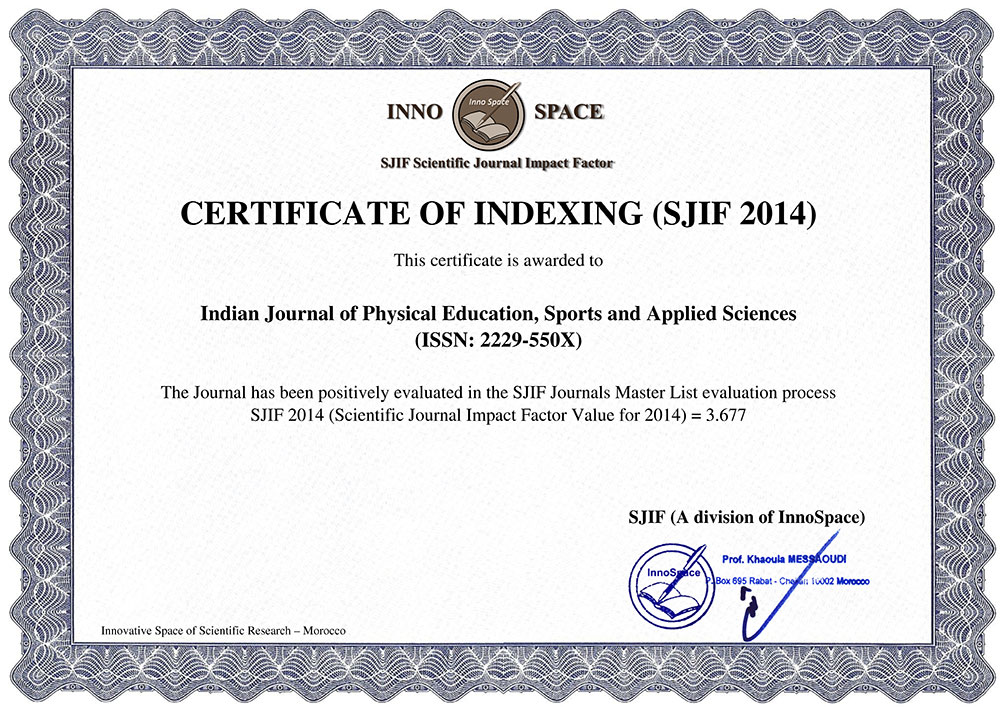COMPARISION OF JOB SATISFACTION BETWEEN MALE AND FEMALE SPORT COACHES OF UTTAR PRADESH
2019, April, Volume 9-Number 2 May 9, 2019| Author name : | Arun Kumar Yadav, Dr. Rajkumar Sharma & Dr. Yuwraj Shrivastava | ||||
|---|---|---|---|---|---|
| Page no : | 99-111 | Volume : | 9 | Issue : | 2 |
doi no.: 05-2016-44975451, DOI Link :: http://doi-ds.org/doilink/05.2019-42578796/
Arun Kumar Yadav1, Dr. Rajkumar Sharma2 & Dr. Yuwraj Shrivastava3
Affiliations
1 Ph. D. Scholar, Department of Physical Education, Dr. C. V. Raman University, Kota Road, Bilaspur (Chhattisgarh)
2 Chief Coach,-Gymnastics, Sports Authority of India, STC Exr. Dhar, Malhar Ashram, Rambagh, Indore (M.P.)
3 Assistant Professor, Department of Physical Education, Dr. C. V. Raman University, Kota Road, Bilaspur (Chhattisgarh)
ABSTRACT
The purpose of study was to assess and compare the job satisfaction between male and female coaches of Uttar Pradesh. Thirty Five ( Males= 23, Females=12) coaches from colleges and universities located in urban region of Varanasi district . were selected as the sample for the study. The MSQ was used to measure job satisfaction. It is a gender neutral instrument that can be administered to either groups or to individuals. The instrument utilizes 20- dimension Likert-type scale format and samples both intrinsic and extrinsic reinforcement dimensions with a total of 100 items. To assess the job satisfaction between male and female sport coaches, Mean, SD and t-ratio were computed for each dimension of MSQ. The results of study revealed that The majority of the male and female coaches from urban area were found experienced in their job. The coaches of different games and sports were found satisfied from their job in colleges and universities in urban area of Varanasi region. Significant differences were found between the male and female coaches on ability utilization, authority and social service dimensions of job satisfaction only.
Keywords: Job Satisfaction, Males, Females, Sport Coaches, MSQ.
DOWNLOAD FULL TEXT: 
BIBLIOGRAPHY
Aamodt, M. (2009). Industrial/ Organizational Psychology. Belmont, CA: Cengage
Edwards, B. D., Bell, S. T., Arthur, W. & Decuir, A. D. (2008). Relationships between facets job satisfaction, task, and contextual performance. Applied Psychology, An International Review, 57(3), 441-465
Herzberg, F., Mausner, B., Patterson, R. O., & Capwell, D. F. (1957). Job attitude: Review of research and opinion. Pittsburgh: Psychological Services of Pittsburgh.
Mount, M., Ilies, R., & Johnson, E. (2006). Relationship of personality traits and counterproductive work behaviors: The mediating effects of job satisfaction. Personnel Psychology, 59, 591-622.
Moser, K., & Gallais, N. (2007). Self-monitoring and job performance: The moderating role of tenure. International Journal of Selection and Assessment, 15 (1), 83-93.
Organ, D. W., & Ryan, K. (1995). A meta-analytic review of attitudinal and dispositional predictors of organizational citizenship behavior. Personnel Psychology, 48, 775-802
Sharma, V., Sharma. J.(2015). Job Satisfaction and Job Performance:Linkages in Real World Journal of Management Engineering and Information Technology . 2(2)
Saari, L. M., & Judge, T. A. (2004). Employee attitudes and job satisfaction. Human Resource Management, 43, 395-407.
University of Minnesota. (1977). Minnesota Satisfaction Questionnaire. Minneapolis, MN: Author.
Wegge, J., Schmidt, K., Parkes, C., & van Dick, K. (2007). ‘Taking a sickie’: Job satisfaction and job involvement as interactive predictors of absenteeism in a public organization. Journal of Occupational and Organizational Psychology, 80, 77-89
Weiss, H. M. (2002). Deconstructing job satisfaction: separating evaluations, beliefs and affective experiences. Human Resource Management Review, 12, 173-194.







